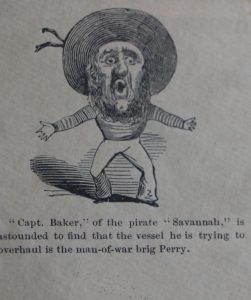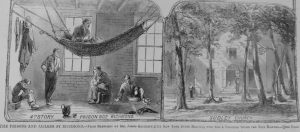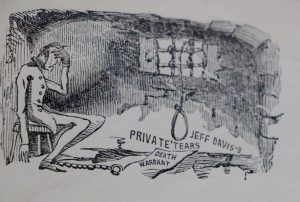19th Century Asymmetrical Warfare: Privateering, the Savannah, and the Enchantress Affair
ECW welcomes back guest author Leon Reed.
 As early as his inaugural address, Confederate President Jefferson Davis warned the United States, and other shippers of the world, that he intended to authorize privateers, the traditional means of naval warfare engaged in by countries who lacked a strong navy. “In the meantime there will remain to us … the well known resources for retaliation upon the commerce of an enemy,” Davis decreed.
As early as his inaugural address, Confederate President Jefferson Davis warned the United States, and other shippers of the world, that he intended to authorize privateers, the traditional means of naval warfare engaged in by countries who lacked a strong navy. “In the meantime there will remain to us … the well known resources for retaliation upon the commerce of an enemy,” Davis decreed.
Applications were quick to pour in for letters of marque, licenses issued by a government that gave private ship owners a license to prey on commercial shipping of the hostile power, an action that would be considered piracy without the letter. The first privateer to set out from Charleston Harbor, on June 2, 1861, was one of the most improbable “warships” ever. The Savannah was a converted pilot schooner and mounted a single small cannon. But the Savannah was fast and seaworthy and was capable of handling heavily laden merchant vessels. On its second day out, the Savannah became the first Charleston privateer to capture a prize. However, the second “merchant vessel” it tracked down turned out to be a warship, the USS Perry. The Perry easily captured Savannah and took its crew to New York City, where they were paraded through the streets to the jeers of a large crowd.
It is interesting that the cover refers to the Savannah as a “pirate,” for that is how the Lincoln administration briefly treated them. The crew of the Savannah had one more part to play. In October 1861, they and the prize crew of the Enchantress, a merchant ship that had been seized by the Confederate privateer Jefferson Davis, were put on trial for piracy and threatened with execution. The position of the Lincoln administration was that the Confederate States of America were not a nation and therefore had no right to issue letters of marque. In return, the Confederates took fourteen prisoners who had been taken at First Manassas or Ball’s Bluff and threatened to execute them man-for-man in retaliation for any executions of privateers.

Noted prisoners who were under threat of execution included Col. Paul Revere of the 20th Massachusetts, grandson of the Patriot leader; Col. Michael Corcoran, first commander of the 69th New York, later of Irish Brigade fame; and Col. A. M. Wood, commander of the 14th Brooklyn, the “Red Legged Devils.” But after Davis wrote a letter directly to Lincoln, Lincoln instructed the U. S. Navy not to continue the piracy trials. The Union officers eventually were exchanged, and there was no further talk of trying privateers as pirates.
In the end, privateers captured a lot of newspaper coverage but had almost no impact on northern trade. The cruisers commissioned by the Confederate navy, such as the CSS Alabama, captured more prizes and certainly managed to damage the U. S. merchant marines and drive up their insurance rates. But despite the headlines, northern trade was not seriously disrupted by the Confederate privateers or commerce raiders.
Excellent article, providing food for thought on the impact of privateering, and commerce raiding (although the inclusion of Major Israel Vogdes on the list of officers facing reprisals, and how he came to be a prisoner of the Confederate Government, was a missed opportunity…)
To my thinking, privateers fit into a larger picture, that included Confederate commerce raiders, torpedoes, ironclad warships, a submarine, spy networks, treaties with Indian tribes, advocacy for the Knights of the Golden Circle, telegraph “wire tapping” (and almost guerrilla warfare.) As well, the attempted use of diplomatic channels in Europe to gain foreign recognition as sovereign nation… these were all efforts of the fledgling Confederate States of America to gain its goal of separate nation status. The use of Privateers could be viewed as “guerrilla warfare on the High Seas,” and the exploits early on provided public reaction on how that style of warfare was viewed, ( the public opinion of pirates and piracy waxes and wanes over time), and whether it could be expanded to the conflict ashore.
Cheers
Mike Maxwell
Mike, thanks for your comment. I have continued to do research on the near-war between the election of Lincoln and First Manassas and have recently had occasion to look at the defenses of the three Florida forts (Pickens, Taylor, and Jefferson) and the career and capture of Major Vogdes. Great yarn! I think the story of the defense of these three forts is a good post for ECW and I’m going to propose it. Thanks for your comment.